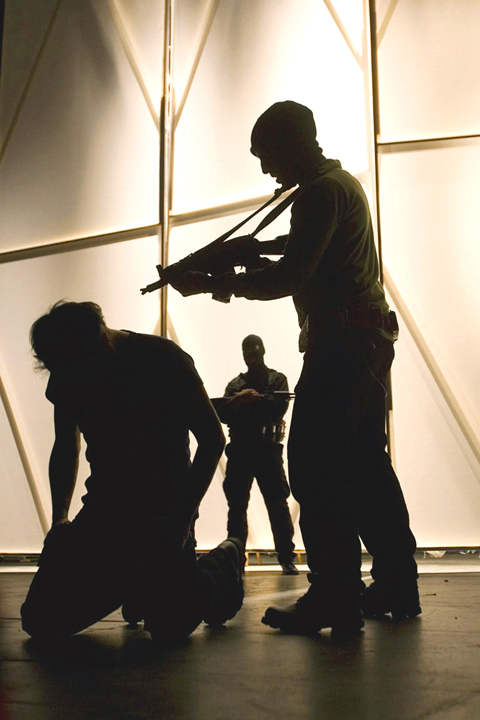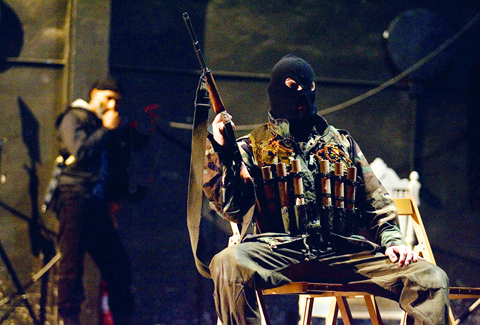Firing shots into the air, a group of Chechen rebels storm a theater in Moscow and take roughly 700 theatergoers hostage. Terrorists blow up commuter trains in Madrid. Two planes plow into the World Trade Center's twin towers in New York, killing nearly 3,000 people.
Terrorism, whether directly experienced by the few or seen on television by the many, is a fact of contemporary life. It is also the central theme of La Fura dels Baus docu-drama Boris Godunov, which begins next Friday at Taipei's National Theater.
"The show is a reflection on global terrorism, [with] archetypal characters," said director Alex Olle in a recent interview with the Spanish-language newspaper Barceloca.

PHOTO COURTESY OF TAIPEI ARTS INTERNATIONAL ASSOCIATION
Boris Godunov fuses a true-life event, the attack on the Moscow's Dubrovka Theater in October of 2002, with Alexander Pushkin's play, which takes its title from the Czar of the same name, who gradually sinks into madness after murdering the Czarevich Dimitri to usurp the throne.
By blending the historical with the contemporary, the real with the fictive, La Fura creates a tragic parable about the quandary between means and ends and how corruption often breeds violence.
"Many times violence is used to gain power, not only through terrorism but also through states," Olle said.

PHOTO COURTESY OF TAIPEI ARTS INTERNATIONAL ASSOCIATION
But the play doesn't so much analyze the causes of terrorism as it shows how terrorism radically alters the people who perpetrate it, and the consequent effect on how we perceive the world.
The troupe's objective with Boris Godunov is to immerse the audience in an extreme experience and, in the process, return theater to its cathartic roots.
The play opens with Godunov brooding over the prince's murder. Preoccupied with bad omens, the Czar fails to notice the balaclava-clad figures sneaking through the room and filling it with explosives. Gradually, the terrorists begin to move out into the audience, shifting the action from the Czar's lodgings to the Dubrovka Theater.
From this point on the audience experiences a simulation of the horrors suffered by the hostages in the Moscow theater: the appearance of the militants, the planting of bombs, the tension of the kidnapping and the arguments among the terrorists.
"[W]e give the terrorists some motives … from the most mercenary terrorist - who could be on either side, to the widowed terrorist - acting more out of vengeance, or hate, or the person who [is doing it] for some ideals," Olle said.
Though the spotlight shines squarely on the individual motives and internal disputes of the terrorists, La Fura's Boris Godunov suggests that the rationale for acts of terrorism have their roots in the foreign and domestic agendas of nation-states. As such, terrorism and its opponents are simply two different sides of the same tarnished coin.

On April 26, The Lancet published a letter from two doctors at Taichung-based China Medical University Hospital (CMUH) warning that “Taiwan’s Health Care System is on the Brink of Collapse.” The authors said that “Years of policy inaction and mismanagement of resources have led to the National Health Insurance system operating under unsustainable conditions.” The pushback was immediate. Errors in the paper were quickly identified and publicized, to discredit the authors (the hospital apologized). CNA reported that CMUH said the letter described Taiwan in 2021 as having 62 nurses per 10,000 people, when the correct number was 78 nurses per 10,000

As we live longer, our risk of cognitive impairment is increasing. How can we delay the onset of symptoms? Do we have to give up every indulgence or can small changes make a difference? We asked neurologists for tips on how to keep our brains healthy for life. TAKE CARE OF YOUR HEALTH “All of the sensible things that apply to bodily health apply to brain health,” says Suzanne O’Sullivan, a consultant in neurology at the National Hospital for Neurology and Neurosurgery in London, and the author of The Age of Diagnosis. “When you’re 20, you can get away with absolute

May 5 to May 11 What started out as friction between Taiwanese students at Taichung First High School and a Japanese head cook escalated dramatically over the first two weeks of May 1927. It began on April 30 when the cook’s wife knew that lotus starch used in that night’s dinner had rat feces in it, but failed to inform staff until the meal was already prepared. The students believed that her silence was intentional, and filed a complaint. The school’s Japanese administrators sided with the cook’s family, dismissing the students as troublemakers and clamping down on their freedoms — with

As Donald Trump’s executive order in March led to the shuttering of Voice of America (VOA) — the global broadcaster whose roots date back to the fight against Nazi propaganda — he quickly attracted support from figures not used to aligning themselves with any US administration. Trump had ordered the US Agency for Global Media, the federal agency that funds VOA and other groups promoting independent journalism overseas, to be “eliminated to the maximum extent consistent with applicable law.” The decision suddenly halted programming in 49 languages to more than 425 million people. In Moscow, Margarita Simonyan, the hardline editor-in-chief of the